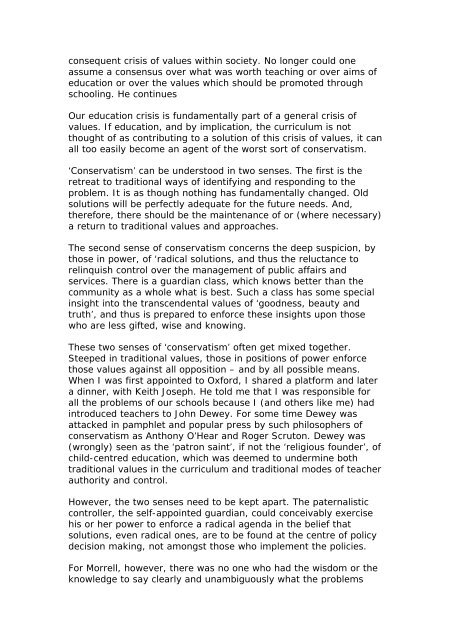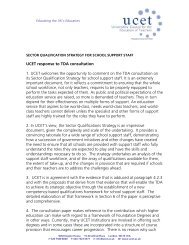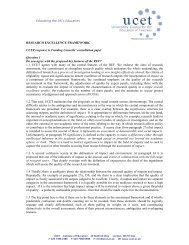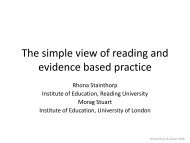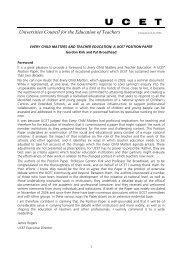The School Curriculum Ten Years Hence - UCET: Universities ...
The School Curriculum Ten Years Hence - UCET: Universities ...
The School Curriculum Ten Years Hence - UCET: Universities ...
You also want an ePaper? Increase the reach of your titles
YUMPU automatically turns print PDFs into web optimized ePapers that Google loves.
consequent crisis of values within society. No longer could one<br />
assume a consensus over what was worth teaching or over aims of<br />
education or over the values which should be promoted through<br />
schooling. He continues<br />
Our education crisis is fundamentally part of a general crisis of<br />
values. If education, and by implication, the curriculum is not<br />
thought of as contributing to a solution of this crisis of values, it can<br />
all too easily become an agent of the worst sort of conservatism.<br />
‘Conservatism’ can be understood in two senses. <strong>The</strong> first is the<br />
retreat to traditional ways of identifying and responding to the<br />
problem. It is as though nothing has fundamentally changed. Old<br />
solutions will be perfectly adequate for the future needs. And,<br />
therefore, there should be the maintenance of or (where necessary)<br />
a return to traditional values and approaches.<br />
<strong>The</strong> second sense of conservatism concerns the deep suspicion, by<br />
those in power, of ‘radical solutions, and thus the reluctance to<br />
relinquish control over the management of public affairs and<br />
services. <strong>The</strong>re is a guardian class, which knows better than the<br />
community as a whole what is best. Such a class has some special<br />
insight into the transcendental values of ‘goodness, beauty and<br />
truth’, and thus is prepared to enforce these insights upon those<br />
who are less gifted, wise and knowing.<br />
<strong>The</strong>se two senses of ‘conservatism’ often get mixed together.<br />
Steeped in traditional values, those in positions of power enforce<br />
those values against all opposition – and by all possible means.<br />
When I was first appointed to Oxford, I shared a platform and later<br />
a dinner, with Keith Joseph. He told me that I was responsible for<br />
all the problems of our schools because I (and others like me) had<br />
introduced teachers to John Dewey. For some time Dewey was<br />
attacked in pamphlet and popular press by such philosophers of<br />
conservatism as Anthony O’Hear and Roger Scruton. Dewey was<br />
(wrongly) seen as the ‘patron saint’, if not the ‘religious founder’, of<br />
child-centred education, which was deemed to undermine both<br />
traditional values in the curriculum and traditional modes of teacher<br />
authority and control.<br />
However, the two senses need to be kept apart. <strong>The</strong> paternalistic<br />
controller, the self-appointed guardian, could conceivably exercise<br />
his or her power to enforce a radical agenda in the belief that<br />
solutions, even radical ones, are to be found at the centre of policy<br />
decision making, not amongst those who implement the policies.<br />
For Morrell, however, there was no one who had the wisdom or the<br />
knowledge to say clearly and unambiguously what the problems


